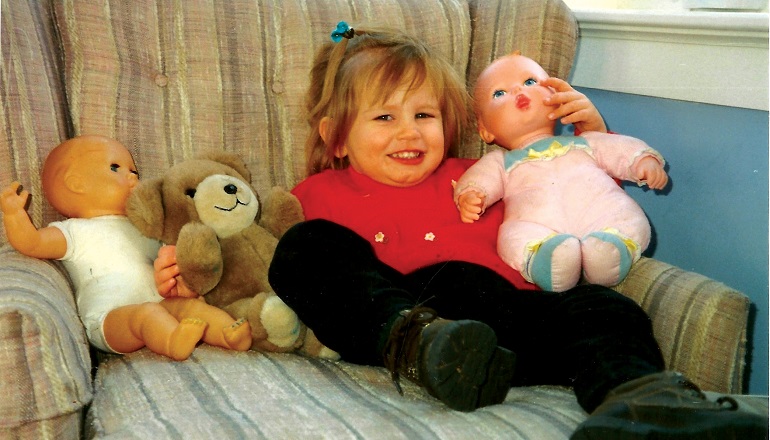My daughter was two when I first met her at the orphanage in Russia. I knew nothing about the first years of her life, and she has no conscious memories of that time—but an elaborate fantasy life that she cultivated gave me a glimpse into how she may have experienced her early years.
In my daughter’s fantasy, which we called “The Game,” she was a toddler named Little One. She had a mommy (me), a father she called Daddy Bear (I was a single parent), and two older sisters, Kate and Sala. Kate was kind, patient, and always came to the rescue of Little One. Sala, on the other hand, would tease her baby sister by taking her food, turning out the lights in her room, or tripping her. A doctor told the family that Little One would never grow up—she might learn things and progress, but she would always have the body of a two-year-old—and gave Mommy and Daddy Bear special pills that would arrest their aging, too, so they would always be able to care for Little One.
The fantasy is one any child might have. The child stays young and adorable forever, and she knows she’ll always be cared for. But I recognized overlays of adoption and my daughter’s personal history, and, as a social worker, I knew the curative value of “playing for real,” as child therapist Richard Bromfield refers to it. That is, sorting out real fears and problems through make-believe, where the child has mastery and control.
Like so many of our children, my daughter had had several losses in her short life by the time we met. Was there a Kate to protect her from aggressive children (like Sala) in the orphanage? Were there kindly caretakers to encourage and applaud her efforts (like Mommy)? In her fantasy world, my daughter devised a magic potion, so the people she needed would never die, and Sala was appropriately reprimanded—often given time-outs and consequences from Mommy and Daddy Bear.
My daughter knew that The Game was a fantasy, and she knew that it was our secret. I remember playing The Game one time on a walk, when she noticed some strangers approaching. “Mom,” she said, “shhh, stop The Game.” I noticed, too, that she didn’t engage in The Game with any of her friends, except for one good friend, who was also adopted.
Encouraging Child’s Play
How does one begin this kind of play? You can seek the help of a therapist trained in filial therapy—teaching family members to use play therapy in a consistent way. Parents can encourage fantasy play by asking questions: “What do you think you were like when you were a baby? What would you do?” Props are also helpful. My daughter often wanted to buy things for Little One at the store. She did get a lot of goodies this way! We had a special place where we kept our trove of baby things—bottles adorned with Sesame Street characters, rattles, pop-up books.
While it’s true that children vary in their inclinations to engage in fantasy play, I sometimes wonder if it is not we who are closed to it. Perhaps we miss signals when our children are trying to initiate this type of play. Are we afraid that by “indulging” in such play we will create whiney monsters who regress to infantile tantrums? Are we afraid that reliving painful experiences may stir them up and inflame them? When I brought my daughter home, there were those who felt I should immediately try to catapult her into the world of her preschool peers. One sitter scoffed that I was “babying” her by allowing her to have a bottle. That sitter didn’t last.
I felt privileged that my daughter taught me The Game and let me into her world. Throughout her childhood, whenever we were having a difficult day, whenever tensions were running high, 20 minutes of The Game was often all we needed to soothe frayed nerves. In social work school we spoke of “regression in the service of the ego.” I think of it as going back in order to go forward. In creating this doorway into her inner world, my daughter also gave me something I had lost but had not been able to articulate: The chance to mother her younger self. Though I could never literally regain the time I had lost with her, I felt at times that I came close to experiencing it.



